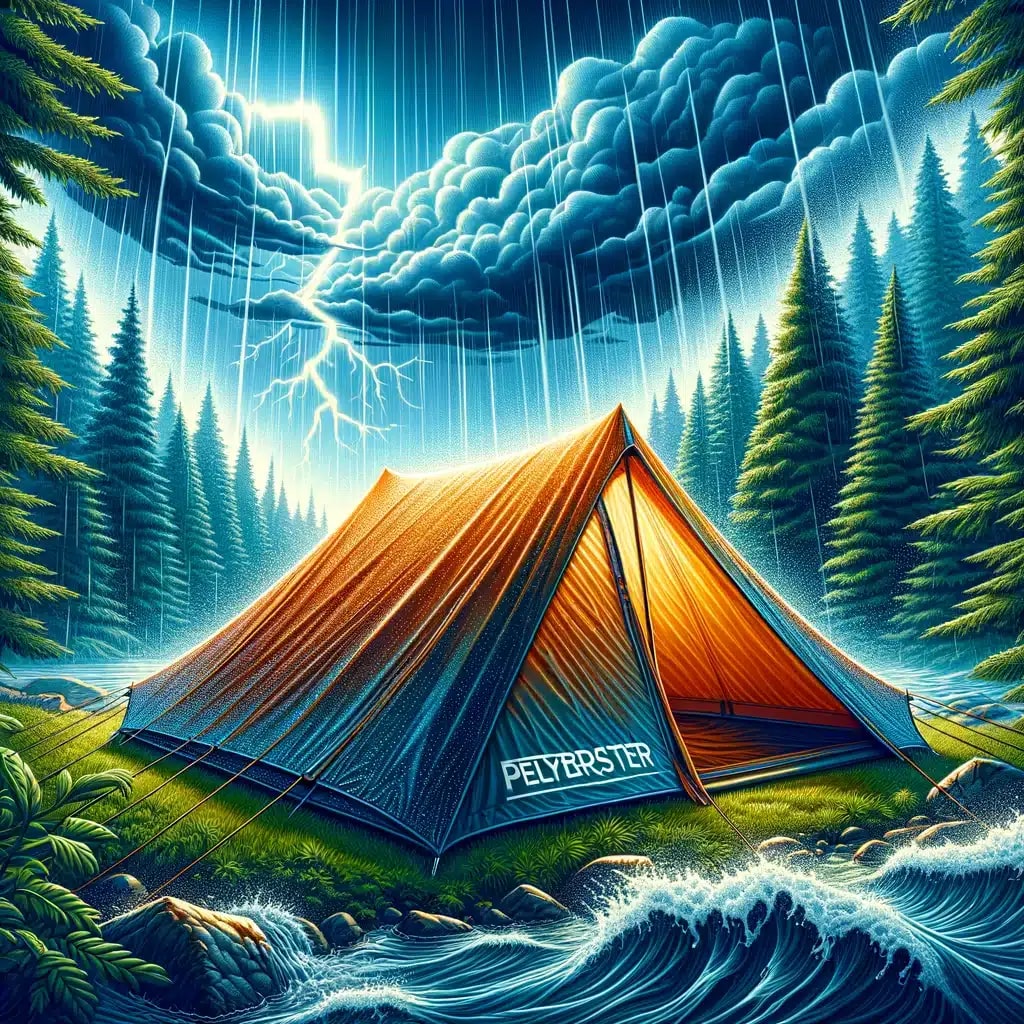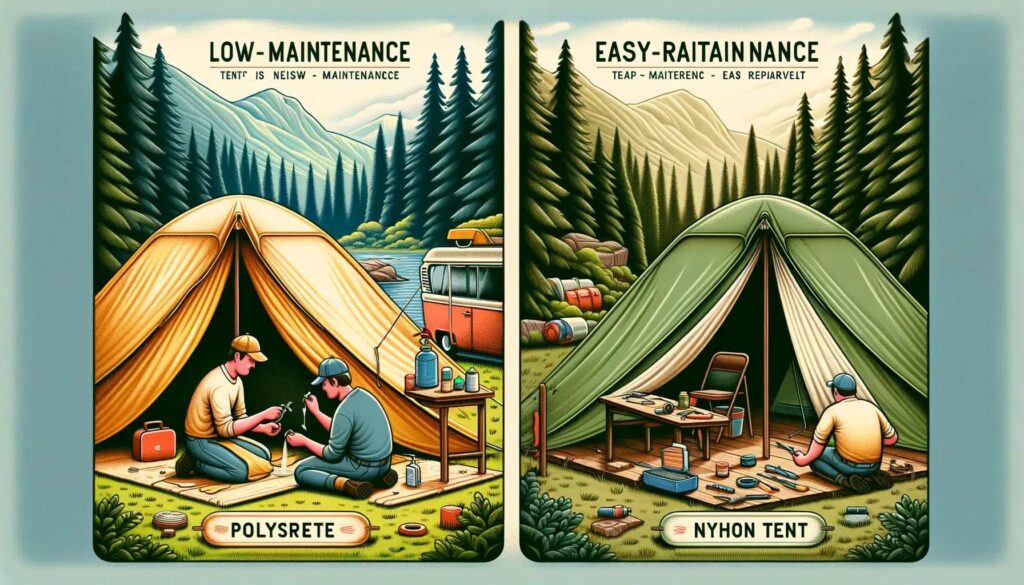Embarking on an outdoor adventure requires careful consideration of the gear, and choosing the right tent is paramount. In the polyester vs nylon tent dilemma, understanding the nuances is crucial. Let’s dive into the world of outdoor shelters and unveil the key differences.
Polyester vs Nylon Tent Showdown
Polyester Tents: Weather-Resistant Marvels

Polyester tents have gained popularity for their exceptional weather resistance. Crafted from synthetic polymers, these tents exhibit outstanding durability against harsh elements. Whether facing relentless rain or scorching sun, a polyester tent stands resilient, ensuring a reliable shelter for your camping escapades.
Nylon Tents: Lightweight Champions

Nylon tents, on the other hand, take the lead in the weight department. Renowned for their lightweight nature, nylon tents are the go-to choice for backpackers and hikers. Despite their featherlight build, nylon tents boast commendable strength, making them a versatile option for those prioritizing mobility.
Durability Face-Off: Polyester’s Endurance vs. Nylon’s Toughness

When durability is the battleground, polyester and nylon engage in a face-off. Polyester exhibits impressive resistance to UV rays, preventing degradation over prolonged sun exposure. Nylon, conversely, stands out with its exceptional tear strength, ensuring longevity in rugged terrains. The choice between the two depends on your specific outdoor needs.
Comfort and Breathability: Polyester’s Breathable Design vs. Nylon’s Ventilation Prowess

Comfort in a tent is non-negotiable. Polyester’s breathable design ensures proper ventilation, preventing condensation buildup. Meanwhile, nylon’s inherent ventilation prowess allows for optimal airflow, enhancing comfort during warm nights. Assessing your camping conditions will guide you toward the tent that aligns with your comfort preferences.
Water Resistance: Polyester’s Shield vs. Nylon’s Quick-Drying Magic
Rain is an unpredictable companion in outdoor expeditions. Polyester tents act as a shield, providing robust water resistance. On the flip side, nylon tents boast quick-drying properties, ensuring a faster rebound after a downpour. Consider your camping terrain and rainfall frequency when deciding which water-resistant feature suits your needs.
Polyester vs Nylon Tent: Aesthetics and Customization
Elevate your camping experience with a touch of personalization. Polyester tents offer vibrant color options and are amenable to customization. Nylon, while limited in color choices, provides a sleek, modern aesthetic. Choose your tent not just for function but to complement your outdoor style.
Setting Up Camp: Polyester’s User-Friendly Design vs. Nylon’s Quick Assembly

Effortless setup is a camping luxury. Polyester tents often boast user-friendly designs, simplifying the pitching process. Nylon tents, however, excel in quick assembly, making them ideal for those on the move. Prioritize your preferences – whether ease of setup or speedy assembly – for a seamless camping experience.
Eco-Friendliness: Polyester’s Recyclability vs. Nylon’s Sustainability
In the age of environmental consciousness, the tent’s eco-friendliness is a key consideration. Polyester tents are recyclable, contributing to a circular economy. Nylon, while not as easily recyclable, stands out for its durability and potential for upcycling. Make an eco-conscious choice aligned with your values.
Polyester vs Nylon Tent: Insulation and Temperature Regulation

Maintaining a comfortable temperature inside your tent is pivotal. Polyester tents offer insulation against cold weather, ensuring warmth during chilly nights. Nylon tents, with their lightweight design, excel in temperature regulation, preventing overheating in warmer conditions. Factor in the expected climate of your camping destination for an optimal choice.
Investing in Quality: Polyester’s Budget-Friendly Appeal vs. Nylon’s Long-Term Value
Budget considerations often play a role in decision-making. Polyester tents, being cost-effective, cater to those seeking quality on a budget. Nylon tents, while initially pricier, offer long-term value with their durability and versatility. Assess your budget and camping frequency to determine the right investment for your outdoor ventures.
Maintenance Matters: Polyester’s Low-Maintenance Charm vs. Nylon’s Easy Repairs

Ease of maintenance can significantly impact your overall camping experience. Polyester tents are low-maintenance, requiring minimal care. Nylon, known for easy repairs, ensures longevity even in the face of unexpected mishaps. Consider your willingness for maintenance efforts when choosing the tent that aligns with your lifestyle.
Polyester vs Nylon Tent Section
In the polyester vs nylon tent debate, understanding the specific characteristics of each material is paramount for an informed decision. Let’s delve into the distinct features that set polyester and nylon tents apart.
Polyester Tents: The All-Weather Warriors Polyester tents excel in providing reliable shelter across diverse weather conditions. Their resistance to UV rays ensures longevity, making them a preferred choice for campers facing extended sun exposure. While slightly heavier than nylon, polyester’s durability compensates for the added weight.
Nylon Tents: Featherlight Mobility Nylon tents take the lead in terms of weight, making them the favored choice for backpackers and hikers. Their lightweight nature doesn’t compromise strength, as nylon tents boast impressive tear resistance. Perfect for those who prioritize mobility without sacrificing durability.
FAQs
Are polyester tents suitable for extreme weather conditions? Polyester tents offer commendable resistance to harsh weather conditions, making them suitable for extended exposure to sun and rain. However, it’s essential to consider the specific demands of your camping destination.
Do nylon tents require special care due to their lightweight nature? While nylon tents are lightweight, they are crafted with durability in mind. Regular care, such as avoiding sharp objects, ensures their longevity. Special care measures are not significantly different from other tent materials.
Can I customize the color of my polyester tent? Absolutely! Polyester tents come in a variety of vibrant colors and are easily customizable. Personalize your camping experience by choosing a tent that reflects your outdoor style.
Which tent material is more environmentally friendly? Both polyester and nylon have their eco-friendly aspects. Polyester is recyclable, contributing to a circular economy. Nylon’s durability allows for potential upcycling. Consider your environmental priorities when making a choice.
Are nylon tents more challenging to set up than polyester tents? Not necessarily. While polyester tents often feature user-friendly designs, nylon tents excel in quick assembly. The choice depends on your preferences and the importance you place on setup speed.
Do polyester tents provide better insulation than nylon tents? Yes, polyester tents offer better insulation, making them suitable for colder weather conditions. If you plan to camp in chilly climates, polyester is a favorable choice for maintaining a comfortable temperature inside the tent.
Conclusion
Choosing between polyester and nylon tents involves weighing various factors, from weather resistance and weight to customization options and eco-friendliness. Your ideal tent depends on the specific demands of your outdoor adventures. Consider the outlined characteristics, prioritize your preferences, and make an informed decision for a comfortable and enjoyable camping experience.














